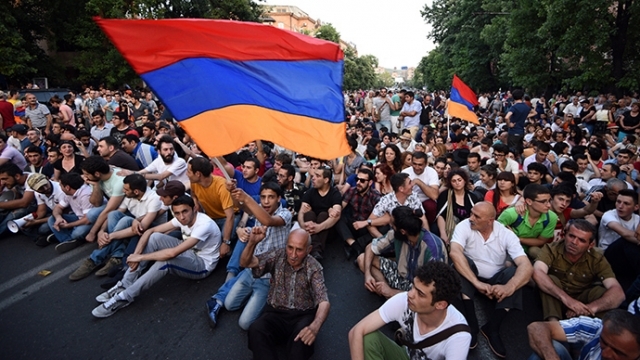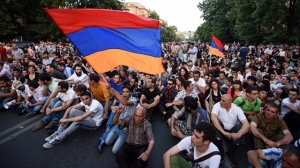Armenian Electricity Protests Stir Russian Concerns of another ‘Maidan’
A wave of protests are sweeping across Georgia’s neighbour Armenia. Unlike Georgia, where protest rallies are part of political life, this has been a surprising development in its southern neighbour. This is why photos of protests in Armenia that had spread a few days ago was like a thunder in a clear sky. In the capital Yerevan and the city of Gyumri, people protested against the increase of electricity prices. Despite the social nature of the protests, every observer agrees that the protest goes beyond social issues and rally participants on Freedom Square in Yerevan are actually protesting against political injustice more than social injustice.
Based on short news pieces coming from the capital of Armenia, policemen are not vehemently opposed to the demands of the rally participants which could create fertile ground for expansion of the protests. Whether we are on the verge of a serious crisis is not clear. Regular citizens in Armenia pose the question of how beneficial it is for them to be under Russia’s influence when fuel, gas and electricity, the biggest exporter of which in the region is Russia, is still expensive. Ultimately, they are worried about the extent to which they rely on Russia. The growth of such opinion is visible in the Armenian online media where speculation has mounted about a potential repeat of Kyiv’s Maidan. Stepan Grigoryan, head of the Globalisation and Regional Research Center, believes that if the Sargsyan government does not concede, it will be confronted Armenian ‘Maidan’.
“The experience of post-Soviet space countries shows that it is very hard to change the government through elections. It is good that in Georgia it took place. The fact is that in post-Soviet countries the governments do not change if serious changes do not occur. I repeat, if the government has made mistakes in relations with the youth and the society as a whole, I do not exclude Armenian Maidan similar to the Ukrainian Maidan. I do not agree with President Putin in many things, including issues of Ukraine and Georgia. But now I say – good job! It gave a good lesson to Armenians. If the government is naпve and not developed enough, it seems that it is even necessary to give them such lessons. Armenians believed Moscow like silly ones and joined the Eurasian Union. I say this with pain. Recent events made me certain that the old political elite of Armenia should be replaced with the new one. The new generation is coming that will definitely change it,” Grigoryan told Interpressnews.
The Kremlin responded to the protest rallies in Yerevan with press secretary of President Putin, Dmitry Peskov stating that the Russian government did not wish to speculate with Yerevan. “We are not making forecasts,” was the brief response of the main voice of President Putin. However, Peskov pointed out the wishes of the Kremlin for the Armenian people. “We wish the brother Armenian nation peace and quick resolution of the existing disagreement. We hope that all questions will be answered according to the laws of Armenia,” Peskov said.
The protest is also related to Armenia’s integration into the Eurasian Union. This is clear to any observer. Even before joining the Union, the political establishment of Armenia demanded that Moscow resolve the issue of transport corridors with Armenia’s neighbors to ensure minimisation of tariff policies. During the entire period before Moscow tried to drag Yerevan to the Union, Armenia’s government kept setting the precondition to Moscow that if it wanted Armenia to join the Customs Union, Moscow should at least ensure open communications between Armenia and Russia and restore the railway link to transport Armenian cargoes to Russia and vice versa.
Back then, Armenian Security Council Secretary Arthur Baghdasaryan, when speaking about the possible railway revival had unwittingly also raised the issue of the railway in Abkhazia. Special representative of the Georgian Prime Minister in negotiations with Russia Zurab Abashidze has pointed out several times that he has been discussing this issue with his colleague Karasin.
The date of the next meeting of Karasin and Abashidze is approaching and the Russian side says the talks in Prague will touch upon the restoration of the railway route between Tbilisi and Sokhumi and it will be interesting to see just how much events in Yerevan between now and then will impact on the talks.
Zaza Jgharkava












